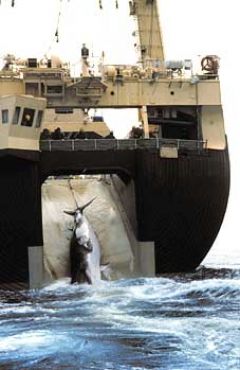In the 19th century, whales were hunted almost to extinction in the Northern hemisphere. Whale-fat and -oil were necessary to grease the steam engines and other machines used in the Industrial Revolution. The Dutch ran a small town on the island of Spitsbergen called “Smeerenburg”, a hellish and dirty place, where the whales were slaughtered, processed and the precious oil and fat were prepared and sent home.
When the whales got scarce around Greenland, bigger whaling ships went to the waters around Antarctica. The same thing happened. The number of whales dropped until several species were on the edge of extinction. When this became known and horrible pictures of dying whales appeared in the media, the public started to protest. The whales must be saved. One of the first global agreements on preserving nature, was a ban on whale hunting. All former whale hunting countries, like the Dutch and the Norwegians, stopped their commercial whale hunting activities.
Except for Japan. The Japanese government claimed rights to hunt down whales, for scientific reasons. Year after year a Japanese fishing fleet goes south, to the icy waters of Antarctica to kill 1500 whales. The “Nisshin Maru” is a giant ship, several hundred feet long, where the whales are slaughtered and the “research” takes place. The meat of whales is still a delicacy in the restaurants of Tokio. A number of smaller ships chase the whales to harpoon them. But they are not alone anymore. Their fishing trip is, literally, under attack. The opponents is the organization “SeaSheperd”. With two small ships, a helicopter and smaller, inflatable, boats, they hinder the Japanese ships, try to obstruct the propellers with ropes and bombard the Japanese with paint bombs. There is a small war going on in the waters of Antarctica. Collisions are no exception and the “Seasheperds” are fanatical and determined eco-fighters. It's on the edge.
But the whales must be saved and the killing must stop. We need the whales for our own completion. We need the whales for their songs.

